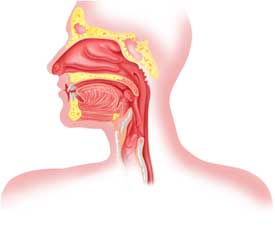PCOS and Snoring: No Laughing Matter

Polycystic Ovarian Syndrome (PCOS) is also known as Polycystic Ovarian Disorder (PCOD). No matter what name you might use though, one thing is certain: No two women will experience the same PCOS symptoms. One such symptom is snoring, and perhaps even a dangerous condition called sleep apnea where you can stop breathing altogether during sleep.
While Insulin Resistance is ushually at the root of PCOS, there is no single PCOS cure. However, with a sensible, healthy diet, a solid exercise schedule, and targeted nutritional supplements you can combat PCOS symptoms, like snoring.
+ Click here to learn about the all natural PCOS 5-Element Solution
+ Click here to read more articles about PCOS and Sleep Disorders
Symptoms
PCOS Symptoms: Snoring and Beyond
 Polycystic Ovarian Syndrome (PCOS) can cause obesity, thyroid problems, skin problems, and even baldness.1 The list of effects goes on, and even includes things like snoring. That might seem, at first glance, like a less serious matter than infertility or obesity, but in truth it’s no laughing matter. As much as we like to poke fun at snoring, it’s actually a very serious medical problem—and for many women, it is indicative of a much more serious underlying condition, namely PCOS (Polycystic Ovarian Syndrome).
Polycystic Ovarian Syndrome (PCOS) can cause obesity, thyroid problems, skin problems, and even baldness.1 The list of effects goes on, and even includes things like snoring. That might seem, at first glance, like a less serious matter than infertility or obesity, but in truth it’s no laughing matter. As much as we like to poke fun at snoring, it’s actually a very serious medical problem—and for many women, it is indicative of a much more serious underlying condition, namely PCOS (Polycystic Ovarian Syndrome).
But the severity of snoring aside, you might be wondering something more basic—like, how an ovarian condition causes a problem such as snoring. As you might imagine, things are a bit more complicated than this. For one thing, snoring might occur because of sleep apnea, another very serious problem.
And as for other indicators, you might find yourself dealing with PCOS symptoms like polycystic ovaries (with or without pelvic pain), infertility, depression, anxiety, anovulation (lack of ovulation), hirsutism (excess hair growth in abnormal places), hair loss, exhaustion, weight gain, obesity, and skin conditions (acne, dandruff, dry skin, skin tags, etc.).
As you can see by these symptoms, Polycystic Ovarian Syndrome (PCOS) is not primarily an ovarian disorder at all, contrary to what its name might suggest. But before we can move forward in our understanding of this conditions’s connection to snoring and other sleeping disruptions, we first need to focus on the specifics of the disorder itself and its primary underlying cause – Insulin Resistance.
Causes
PCOS: A Tricky Disorder to Pin Down
 PCOS (Polycystic Ovarian Syndrome) is one of the most common hormonal disorders in the world, even the most common of all women’s hormonal disorders. It affects millions of women, including somewhere between 5-10 percent of women of childbearing age.1 The bottom line is that this disorder needs to be talked about, because it affects so many of us.
PCOS (Polycystic Ovarian Syndrome) is one of the most common hormonal disorders in the world, even the most common of all women’s hormonal disorders. It affects millions of women, including somewhere between 5-10 percent of women of childbearing age.1 The bottom line is that this disorder needs to be talked about, because it affects so many of us.
But just because it is commonplace doesn’t mean it’s well understood. Actually, many people erroneously think it is just a condition of the ovaries, which it really isn’t. In fact, Polycystic Ovarian Syndrome (PCOS) is, at its root, a hormonal disease, one usually provoked by a condition known as Insulin Resistance. Insulin Resistance condition causes your body to lose its ability to absorb glucose from the bloodstream. When left untreated, Insulin Resistance can develop into diabetes, obesity, or Metabolic Syndrome, as well as PCOS (Polycystic Ovarian Syndrome).2
Your body, and ovaries in particular, respond to increases in insulin by other hormone production and changes. This imbalance of hormones is really what causes so many problems throughout your different bodily systems—for instance, excess testosterone can lead to troubles conceiving, as well as male pattern baldness and acne. And as you might imagine, it’s also this hormonal imbalance that yields significant problems with sleep patterns, like snoring and sleep apnea.
Health Risks
PCOS and Sleep Apnea: Robbing Your Zzzzzz’s

Sleep apnea is far from being a “minor” symptom of PCOS (Polycystic Ovarian Syndrome). It’s actually a very serious health concern. In fact, it’s a major health problem regardless of whether or not it’s attached to Insulin Resistance. For those who aren’t familiar with this condition, it’s the involuntary closure of the upper air passage at night, which leads to brief moments when your breathing actually stops.3 Some of the symptoms include fatigue and daytime sleepiness, which is the result of a poor night’s sleep. It can also lead to choking and gagging fits during the night and, of course, snoring.4
What’s the connection between PCOS and sleep apnea? Many researchers say the two conditions are related to the same basic hormonal condition. Certainly, study after study indicates that women who suffer from Insulin Resistance have significantly greater odds of also having sleep apnea. In fact, a woman with PCOS (Polycystic Ovarian Syndrome) is some thirty times more likely to suffer from sleep apnea than a woman without it.
Dangerous Snoring
Certainly, women who suffer from excessive snoring have myriad other medical problems, many of them quite severe. For instance, individuals who suffer from these kinds of sleep disorders are three times more likely to be involved in motor vehicle accidents—and it isn’t difficult to understand why this is. After all, snoring disrupts your sleep to the extent that daytime drowsiness, fatigue, and slowed reflexes are sadly common. Individuals with sleep apnea or excessive snoring are also prone to making rash decisions regarding work and money. There is an increased risk for depression and also for thyroid and heart problems. It can also cause emotional stress in relationships when neither you nor your partner can get a good night’s rest.
Many of the connections between sleep and these other problems are still being investigated. According to many scientists we simply do not understand the physiological ramifications of quality rest. However, what’s obvious is that if your snoring keeps you (or others) up all night, or it causes you to have restless sleep, it’s very much a major medical issue.
Natural Therapies
Beating Snoring Problems Naturally
What you should know about all of these different health problems and medical ramifications of PCOS (Polycystic Ovarian Syndrome) is that they shouldn’t give you cause for hopelessness or despair. That’s not to say they aren’t serious—quite the contrary. The point is there’s good news since it can be treated. 
Understanding Insulin Resistance is the key to managing your Polycystic Ovarian Syndrome (PCOS) and getting a good nights rest. For a long time, it was thought the best way to handle this condition was to deal with the ovaries directly, through ovarian surgery or related medications. More and more, however, doctors are realizing the best way to cope with these diseases is to treat the root cause—namely, Insulin Resistance.
And Insulin Resistance can be addressed naturally, simply by making improvements to your lifestyle. Start by improving your diet. Take in more nutrients, and make sure you have a protein with every meal. Consume more fruits and vegetables. Cut out the refined sugars and processed foods, and stick with whole grains as best you can.5
Add exercise to your daily routine as well. Exercise has been proven to boost levels of insulin production, which is obviously a good thing for anyone dealing with Insulin Resistance. Additionally, it will help you lose weight and lead an altogether healthier lifestyle.
Enlist a support system, too. This is one of the best things you can do to help you in your quest to beat Insulin Resistance. Having the accountability and encouragement of an exercise buddy, or just having someone you can talk to, will go a long way toward helping you stay focused and motivated. Your support member doesn’t even have to be a PCOS (Polycystic Ovarian Syndrome) patient—anyone looking to lose weight and get healthy will be helpful.
Taking targeted nutritional supplements that have been formulated to have a positive impact on the body’s structures and functions with respect to dealing with Insulin Resistance can also be a positive step forward.
Make sure you check the resources made available here by Insulite Health. You’ll learn the connections between healthier lifestyle choices and natural remedies for Insulin Resistance. The Insulite PCOS System will provide you with a great, natural way to get the upper hand on this condition so you can start getting those good, healthy zzzzz’s again.
Next Steps
- Take the PCOS Quiz! Get your score and assess your hormone health risks.
- Join our Facebook Sisterhood Group Pose your questions to this group of like-minded women. Get the answers to your questions and the support you need.
- Checkout the Hormone Reset. Guided Practices to eliminate anxiety, lose weight and boost energy.
We are committed to helping women reverse their symptoms of hormone imbalance – a major cause of excess weight gain, adult acne, unwanted facial hair, depression, anxiety, and heartbreaking female infertility.
©Insulite Health empowers women with hormone imbalance to transform their lives through a process of healing with the Natural Hormone Solution –a complete solution for helping women reverse the symptoms hormone imbalance..

